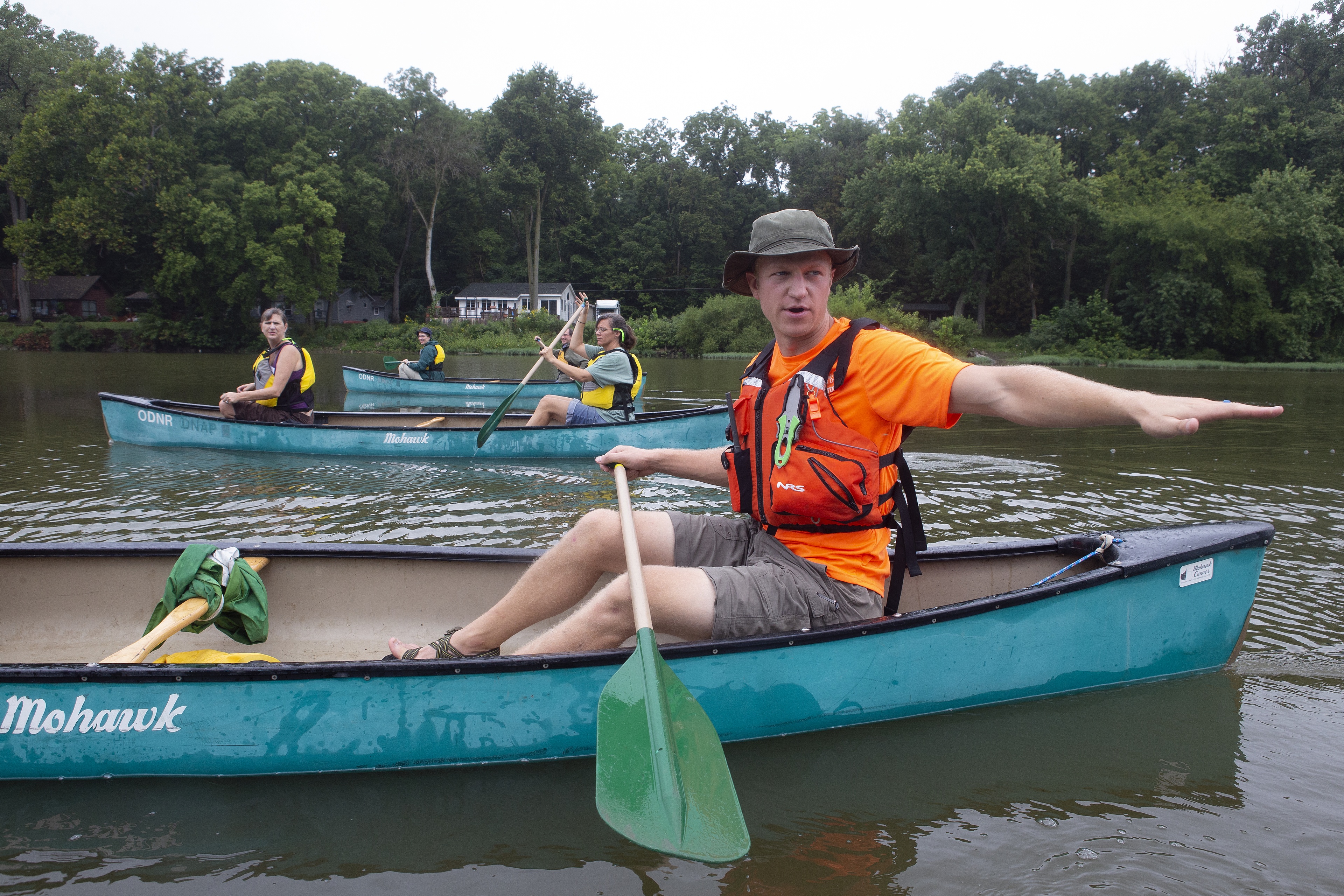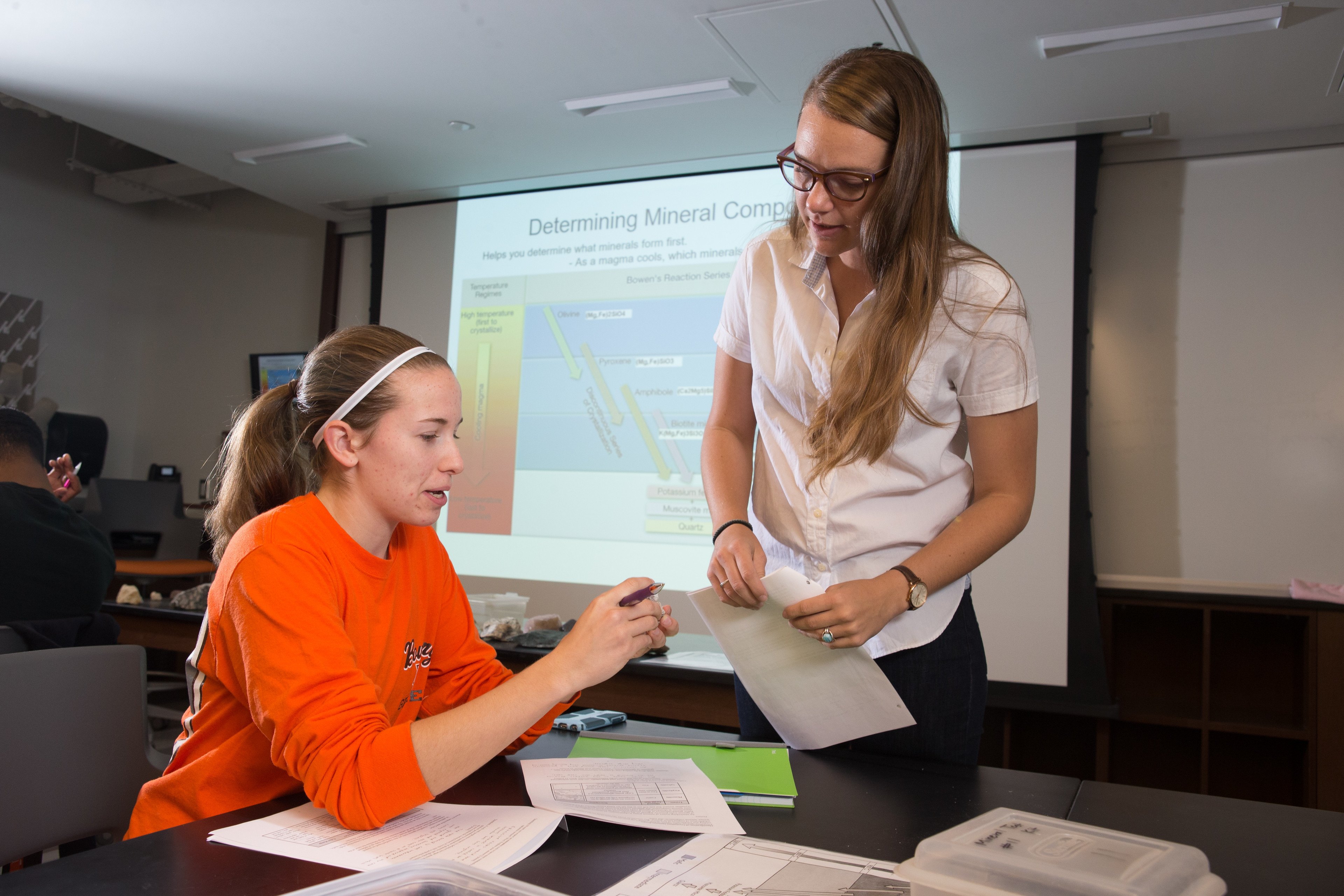Nationally recognized for student experience
The Wall Street Journal

Bachelor of Science (B.S.)
Geology: Hydrogeology
The BGSU bachelor of science in geology with a specialization in hydrogeology is the only hydrogeology specialization in Ohio.
Environmental change will make competition for water resources more intense, leading to rising demand for hydrogeologists in the coming decades.
About 50% of the people in the world rely on groundwater for drinking and irrigation of crops. The study of the interplay of water and the environment is important for the conservation and protection of this precious resource.
The BGSU geology degree with a hydrogeology specialization will provide a rigorous framework for examining the hydrologic processes. No minor is required with the hydrogeology specialization.
Stewards of precious resources
Hydrogeologists—who are earth scientists— solve problems related to water quality and availability.
As the climate changes, so water availability will change. New ways of managing and monitoring water resources will need to be found. The technical aspects of this work are the domain of hydrogeologists. They will increasingly be required to interact with environmental and government agencies and stakeholders who use water, which means practically everyone.
The other role of hydrogeologists is helping ensure that water supplies remain safe and healthy. Natural and human forms of pollutants are identified and mitigated by graduates with hydrogeology degrees.
BGSU is the only public university in Ohio with a hydrogeology specialization degree.
#1 public university in Ohio for career prep
The Wall Street Journal
Career - what can you do with a geology degree specializing in hydrogeology?
Natural resource extraction and management are heavily regulated. Anyone working in hydrogeology will be interacting with regulators, government at all levels, and stakeholders who have business, environmental and public health interests.
A wide variety of career options for graduates with a bachelor of science degree in geology with a specialization in hydrogeology can be found. Working in the field, in the lab, in the office or interacting with the public are all possibilities.
As water availability shifts because of climate change, the demand for hydrogeologists will increase.
Further study will qualify students for more senior positions. Research jobs in government or universities will mainly require a doctoral level qualification.
Career paths
- Environmental Geologist
- Hydrogeologist Consultant
- Environmental Engineer
- Water Resources Manager
- Quantitative Hydrogeologist
- Groundwater Modeling
- Project Hydrogeologist
Quick Facts from the Bureau of Labor Statistics
Curriculum
All Earth sciences require a sound base in math, chemistry and physics. These core STEM skills are used to build a thorough knowledge of the water cycle and its interactions with the different parts of the Earth.
Lake Erie and its watershed provide excellent examples near the Bowling Green campus. Field sites near and far are studied to build strong skills in assessing and documenting diverse types of physical systems.
Quantitative literacy and critical thinking skills are used to interpret data and generate findings and recommendations. Communication skills are critical for working with government, private industry, public utilities and community stakeholders.
The ability to share technical knowledge with a broader public in a digestible, relatable and ethical way is a critical skill in hydrogeology.

Sample courses
- Earth Structures & Tectonics
- Earth Materials
- Surface Water Hydrogeology
- Groundwater Hydrogeology
- Limnology
- Severe Weather
- Aqueous Geochemistry
- Remote Sensing
#1 university in Ohio – big or small, public or private – students would choose again
The Wall Street Journal
Field Camp
The BGSU field course exposes students to a variety of geological settings and applications, integrating the latest technology in field mapping. Geology students learn how digital mapping and data analysis using Geographic Information Systems (GIS) can facilitate fieldwork and improve the understanding of the geology of an area.
Working with sedimentary, metamorphic and igneous rocks, students learn how to make systematic observations, accurate recordings and sound interpretations of the geology seen in outcrops.
Field exercises include measuring and analyzing sedimentary sections, construction of geologic maps, structural analysis of folds and faults, slope stability analysis and environmental assessments. Paleobiology specialization students will examine the fossil record of all locations visited.
Students will learn to use Brunton compasses, laptop and ruggedized tablet computers, GPS receivers, aerial photographs, topography maps, satellite images and GIS databases in their projects.
Field areas are in the Basin and Range, Colorado Plateau and Rocky Mountain provinces.
The AIMS Learning Community
The Academic Investment in Mathematics and Science (AIMS) Learning Community is a place to live and learn alongside peers who share your interest and enthusiasm for science, technology, engineering and math. This learning community assists students in navigating challenging first-year courses in science, technology and math disciplines while making lifelong friendships.
It is a friendly, comfortable spot on campus where you can develop relationships with your classmates, faculty mentors, and academic advisors. The AIMS Learning Community is designed to promote and strengthen these relationships.
Geology Club
The Bowling Green State University Geology Club serves geology majors and faculty and other geologically inclined students from across the University. The club strives to foster the communication of ideas within the geological sciences and create social and professional opportunities for students.
The Geology: Hydrogeology program is part of the School of Earth, Environment and Society in the College of Arts and Sciences.
Accreditation
Bowling Green State University [BGSU] is accredited by the Higher Learning Commission. BGSU has been accredited by the Higher Learning Commission since 01/01/1916. The most recent reaffirmation of accreditation was received in 2022-2023, with our next reaffirmation of accreditation scheduled for 2032-2033. Questions should be directed to the Office of Institutional Effectiveness.
Request Information
Updated: 05/23/2025 01:08PM

